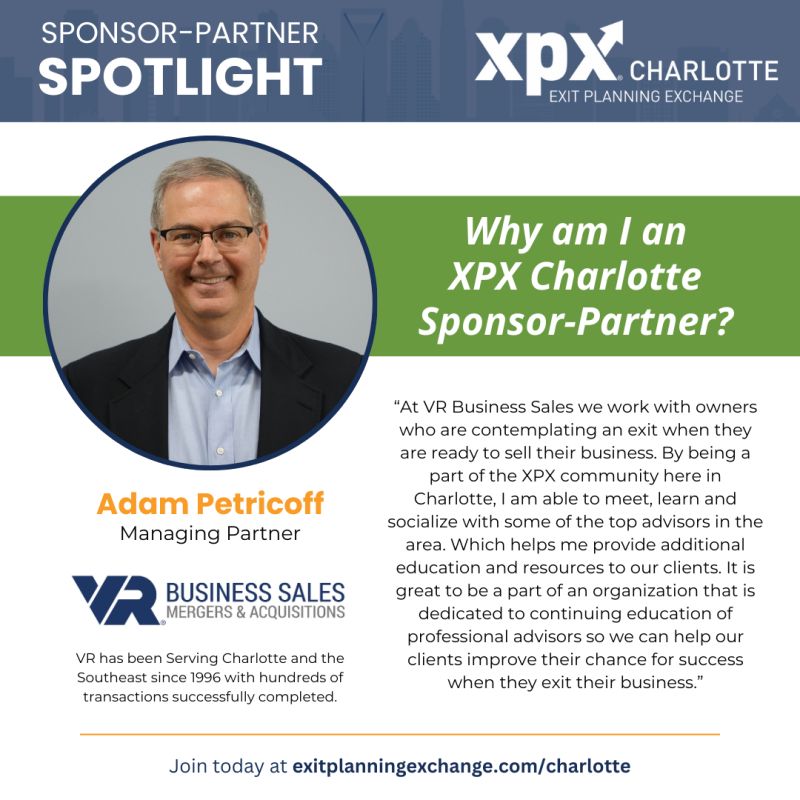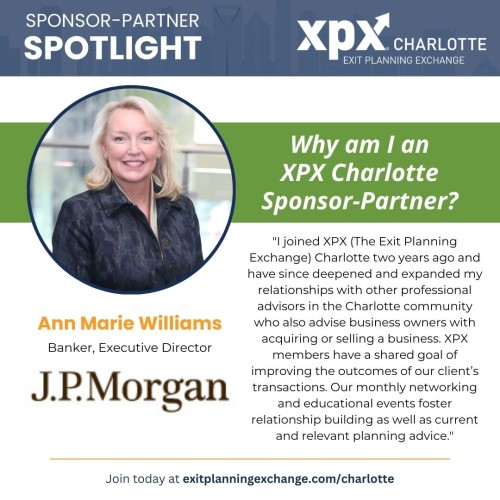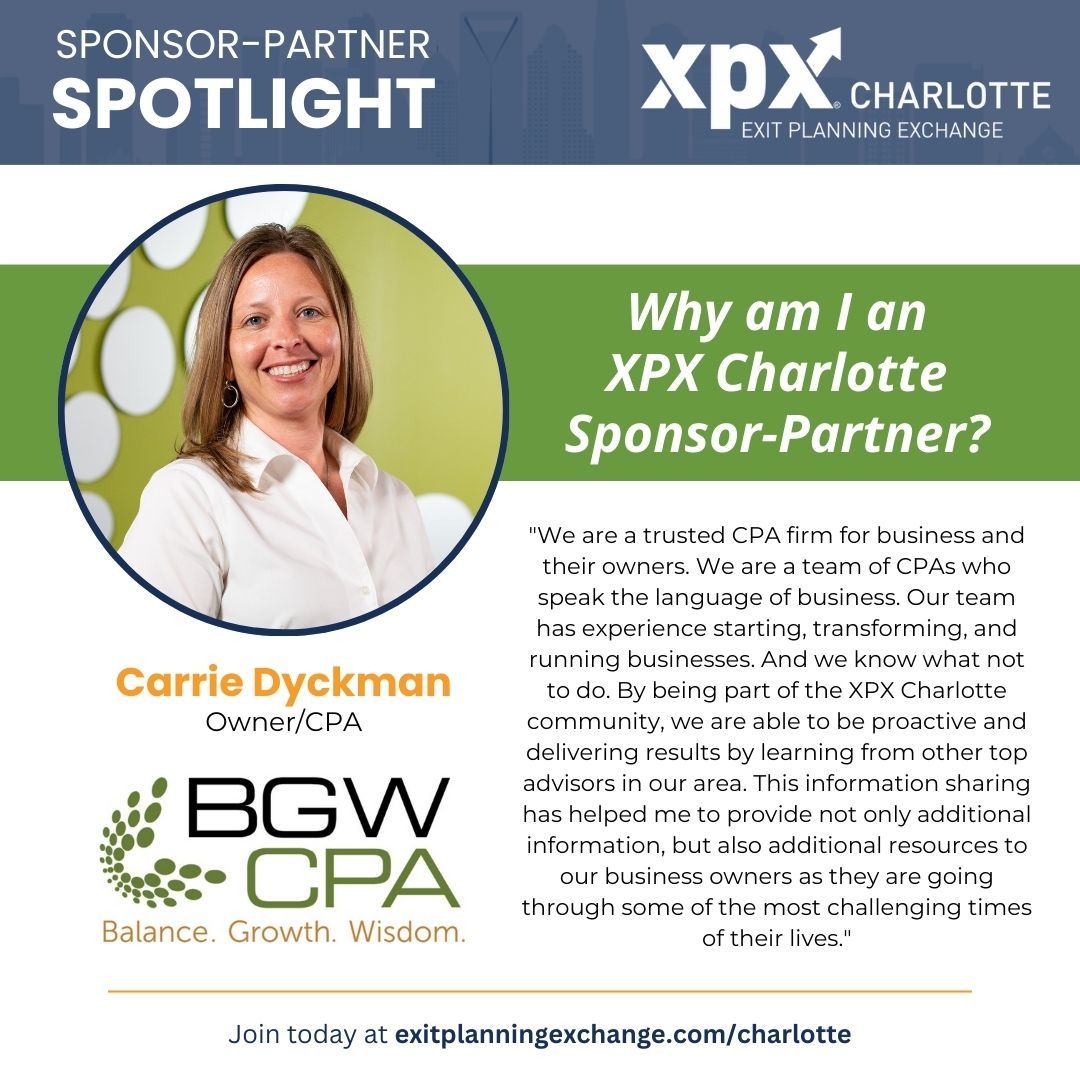XPX Chapters
Welcome to XPX Charlotte
XPX Charlotte is a multi-disciplinary community of professional advisors who work collaboratively to help owners of lower/middle-market companies build valuable businesses and assist them in preparing and executing a successful transition.
XPX Charlotte members:
- Embrace a shared responsibility for educating each other on the many disciplines of exit planning,
- Work to develop trusted relationships enabling client collaboration, and,
- Take ownership for sharing the importance and urgency of effective exit planning with business owners in our community.
XPX Charlotte’s success is continually measured by optimal outcomes of business value growth, business value transfer and owner life and legacy.
XPX Charlotte Events
Our mission is to achieve optimal exit outcomes for business owners in our community. To that end, XPX Charlotte organizes events largely focused around knowledge sharing and inspiring collaboration among members. Most months, we hold educational and community building events for our professional members on the 3rd Wednesday of the month. On occasion, we will hold purely social event to further community building.
Like many other XPX chapters, XPX Charlotte holds a Power Networking program, a members-only virtual event where participants are grouped into diverse teams of professionals to “connect, collaborate & create results for your Clients!”. XPX Charlotte members are also encouraged to participate in Cross-Chapter Power Networking events organized by XPX Global. These are published each month on our Events page.
XPX Charlotte Featured Sponsors




The Latest News – XPX Charlotte
Latest – XPX Charlotte
When you sit down for an intergenerational conversation about the future of the family business, it’s essential to have multiple goals before you. For instance, maintaining healthy family relationships is as vital as ensuring the business’s ongoing success during a period of transition. Family conflicts often arise from differing opinions, visions, values, or unresolved issues. Emotions can escalate, clouding judgment and diverting focus from the goal of a successful transition. A structured approach not only aids in crafting a resilient succession plan but also fosters unity, ensuring that the business thrives, and relationships are preserved for future generations. In particular, having structured, intergenerational conversations can help your family address ten common issues, ensuring smoother transitions and superior outcomes. 10 Common Issues that Succession Planning Can Resolve Vision for the Future Each generation has its vision for the future of the business. Often, the founding generation wishes for their successors to continue doing things just as they have done, while the children or grandchildren long to do things their way. An intergenerational conversation can help to clarify expectations and aspirations, helping all stakeholders find common ground. Roles and Responsibilities Clarity on who will take on which roles and responsibilities after the transition is crucial. This includes defining new roles for outgoing members if they plan to stay involved, as is often the case with parents who wish to ease away from the business without being cut out of the loop entirely. A structured conversation helps everyone know their role and avoid overstepping. Leadership Style New management often involves a new leadership style, especially when successors have very different personalities or communication styles from their parents. Again, a structured, intergenerational conversation is imperative to ensure new leadership styles can seamlessly integrate into the family business. Financial Expectations Expectations regarding profit distribution, reinvestment, and personal financial planning are often contentious. Having a transparent financial discussion can help to eliminate misunderstandings. Conflict Resolution Conflict is bound to happen even in the most tightly knit families and the most jovial business environments. A conversation about succession planning can provide an opportunity to discuss potential resolution methods, perhaps even introducing a process for third-party mediation. Training and Development Address the need for training and preparation for those taking on new roles, including the possibility of external education or internal mentoring. It is much better to clarify the expectations (and the available resources) before a new generation takes over. Cultural and Value Differences Generational shifts bring changes in company culture and values. These shifts must be managed carefully to maintain the company’s identity, even during a period of transition or evolution. Retirement and Exit Strategies Discussing retirement plans and exit strategies is essential for outgoing family members. This includes financial security and the emotional aspects of leaving the business. It’s good to help the older generation feel validated and supported while also allowing their successors a chance for empathy and understanding. Legal and Estate Planning Ensure all legal issues, including wills, trusts, and ownership documents, are addressed. Legal clarity can prevent any friction or conflict in the future. For this part of the conversation, it may be prudent to invite an attorney to be present. Recognition and Legacy Discuss how the contributions of outgoing family members will be recognized. It’s crucial to respect their legacy and to reinforce their lasting value to the company. Have a Clear Conversation About Family Business Succession Planning Succession planning is vital to preserving your family business legacy and maintaining smooth relationships between the generations. If you have any questions about initiating these structured conversations, we’d love to help. Reach out to WhiteWater Consulting at your convenience!
In order for your family business to outlive its founder, careful succession planning is a must. That means finding the most frictionless way to pass both leadership and ownership from one generation to the next. While some family business dynamics lend themselves to smooth and simple succession, others hit bumps in the road. One of the best ways to steer clear of these obstacles is to have some awareness of what they are. In this post, we’ll round up just a few of the factors that complicate family business succession planning. If any of these concerns loom large for your family business, reach out to the WhiteWater Consulting team; we’d love to offer whatever guidance we can! Common Obstacles to Family Business Succession Planning Lack of Communication Between Generations One of the biggest reasons for inadequate succession planning is the lack of communication between generations. Often, this hinges from the emotional nature of family business succession planning. The founding entrepreneur may be uncomfortable discussing their own mortality, or hesitant about “pushing” the family business on an heir who may or may not desire it. These and similar concerns mean that, too often, succession planning isn’t really discussed. Lack of Clarity About Successors In some family businesses, there may be just a single son or daughter who’s interested in taking the mantle. But what happens if there are multiple heirs, all with their own different skill sets and talents? When there isn’t a clear or obvious successor, that can make succession planning dicey… and often, the temptation is to put off important conversations until it’s almost too late. Operational Challenges While many of the most common obstacles to family business succession planning involve communication, other issues are more operational in nature. Consider a few practical hurdles that keep family businesses from implementing effective succession plans: Often, business owners don’t know where to start with training and developing the next generation of leadership. Tax issues, along with broader estate planning considerations, can seem complex and insurmountable, especially if there isn’t a skilled attorney involved. There may also arise challenges, both within the family and among non-family employees, to any sense of change within the company. It’s also difficult to create effective legal and governance structures; a business consulting company might be helpful for establishing a family council or something similar. These are just a few of the operational hurdles that can keep succession plans from advancing. Get Guidance for Your Succession Planning Perhaps the single biggest reason why family businesses don’t invest in a serious, strategic succession plan? They don’t know about the resources available to help them. You don’t have to pursue succession planning all by yourself. At WhiteWater Consulting, we’d love to talk with you about effective solutions to preserve what’s special about your family business, all while ensuring the company lasts for generations to come. Reach out to our team whenever you’re ready to chat.
In the competitive world of business, marketing plays a pivotal role to drive revenue generation, brand equity, and overall business valuation. Companies that view branding and advertising as a growth strategy are twice as likely to see revenue growth of 5% or more than those that don’t (source: “Read our case study for details. A pilot program is a great way to get started with evaluating how marketing can support the sales process. Be sure to give the program enough time and budget to be effective. In the B2B environment, it often does not take much to recoup the costs of a successful marketing campaign. Getting Started In today’s digital age, businesses that fail to leverage marketing risk being left behind by competitors who effectively tell their story and reach their target audiences. As a trusted advisor, you have the opportunity to guide business owners in recognizing marketing’s potential to drive sustainable growth, profitability, and long-term enterprise value. Knowmad is here to help you design and build a digital marketing program that gets measurable business results. Reach out to William McKee and discover the potential that a data-driven marketing plan can make for your business.
Over the last couple of years, we’ve seen a worrisome trend of employees disengaging from their work. Sometimes dubbed “
In the fast-paced landscape of today’s organizations, the missing link that often separates successful ventures from mediocre ones is trust. Trust is the glue that binds leaders with their stakeholders, creating an environment where collaboration thrives, innovation flourishes, and everyone feels valued. To bridge this trust gap, we propose a formula that encapsulates the essence of effective leadership—the 5 C’s of Leadership. 1. Communication: The Foundation of Relational Trust At the core of the 5 C’s lies communication, the bedrock upon which trust is built. It goes beyond merely transmitting information; effective communication involves active listening to understand and speaking to be understood. Leaders must foster an environment where every voice is heard, creating a sense of openness and transparency. When communication flows freely, trust is nurtured, and stakeholders feel a genuine connection with the leadership. 2. Connection: Managing by Walking Around Connection is the second pillar, urging leaders to step out of their offices and immerse themselves in the daily rhythm of the organization. It involves spending quality time with team members, being present when they start their day, and showing appreciation at the day’s end. But connection extends beyond internal teams—it encompasses engaging with customers, vendors, and community leaders. By sharing the organization’s mission, vision, and values, leaders build bridges that connect diverse stakeholders, fostering a sense of unity and common purpose. 3. Commitment: Anchoring to Mission, Vision, and Values Commitment is the anchor that prevents leadership from drifting into uncertainty. Leaders must be steadfast in their dedication to the company’s mission, vision, and values. This commitment goes beyond lip service; it involves actively shaping and building the organizational culture. When stakeholders witness leaders unwaveringly dedicated to a common goal, trust is solidified, creating a stable foundation for growth and collaboration. 4. Care: Nurturing Your People Care is the empathetic thread that weaves through the fabric of trust. Leaders must genuinely care for their people, recognizing them as individuals with unique needs and aspirations. This involves not only professional development but also a focus on the overall well-being of the team. By demonstrating genuine concern for the individuals within the organization, leaders cultivate a culture of trust, where each person feels valued and supported. 5. Curiosity: A Leader’s Lifelong Learning Journey Remaining curious is the fuel that propels a leader’s journey towards growth and success. Acknowledging that there is always more to learn, leaders should invest time in asking questions, seeking different perspectives, and gathering input from diverse sources. This curiosity leads to a more robust decision-making process and better outcomes. Embracing a mindset of continuous learning not only inspires trust but also fosters an environment of innovation and adaptability. Incorporating these 5 C’s into leadership practices provides a comprehensive roadmap for building and maintaining trust with stakeholders. It is not a one-time effort but an ongoing commitment to fostering a culture of trust, openness, and collaboration. As leaders strive to implement these principles, they will witness the transformational impact on organizational dynamics. Trust becomes the catalyst for enhanced teamwork, increased productivity, and a shared commitment to achieving common goals. In an era where trust is often a scarce commodity, leaders who embrace the 5 C’s will stand out as beacons of authenticity and reliability, guiding their organizations toward sustained success and growth.
As a long-time business consultant and value growth advisor to middle-market companies, I frequently met business owners who didn’t recognize the urgency to plan for an eventual business ownership transition. Such business owners commonly find themselves catastrophically unprepared when the time comes to sell their business, costing them millions of dollars in lost value. I truly believe business owners are the heroes of our American economy, and they deserve to be fully rewarded for their many years of blood, sweat and tears building a business, employing our friends and neighbors, and supporting their local communities. I got to know the Exit Planning Exchange back in 2019 from a colleague who founded XPX Atlanta. I was very impressed how XPX members would educate each other about ways their clients could prepare for a better exit outcome. I saw how they would develop trusting relationships with other XPX members, combining their unique talents and expertise as a team to help a business owner meet or exceed their exit goals, leaving with a sense of fulfillment and the financial resources to enjoy the next phase of their life. I knew we had nothing like XPX in North Carolina, and our local business owner community would benefit greatly if we did. I was inspired to lead a small group of talented and committed business professionals to launch XPX Charlotte as a NC non-profit organization in 2021. Today, I’m proud that XPX Charlotte has become the area’s premier organization for business professionals with a passion for knowledge sharing and a commitment to help improve exit outcomes for business owners in the Charlotte region. If you share that passion and commitment, I hope you’ll join us! Tom Bixby XPX Charlotte Founder, Past-President CEO, EvaluSys LLC
Community
Upcoming Chapter Events
Contact & Connect
Chapter Events
Gold Sponsors
Investments, estate planning, liquidity events, managing cash
Silver Sponsors
Business Valuation Specialist | Buy-Side & Sell-Side ESOP Advisory | Exit Planning | Transaction Advisory | Estate & Gift Tax | Financial Reporting | Litigation | Family Law
A business owner is considering selling their privately held business and seeking professional representation
To prevent legal issues from becoming an obstacle to your professional and business success.
You have a client in transition that needs help making smart decisions with their money. My planning advice primarily addresses clients' cash flow, wealth protection and transfer needs as well as and philanthropy.
You are trying to grow your business and planning for the eventual exit.
Bronze Sponsors
The greatest asset a company has is its people. We stand ready to serve when you have questions or needs regarding a comprehensive HR strategy, employee engagement and company culture.
You have a client looking to sell, execute a management buy-out, recapitalize their business or buy other companies
FocusCFO is a leader in embedded fractional CFO services. Guiding entrepreneurial leaders on their climb to sustainable, transferrable business value.
You are looking for tax planning and consulting, financial statements for lenders, bonding companies, private equity investors; you're 5 - 10 years away from retiring and you'd like to create the best enterprise value possible for the company.